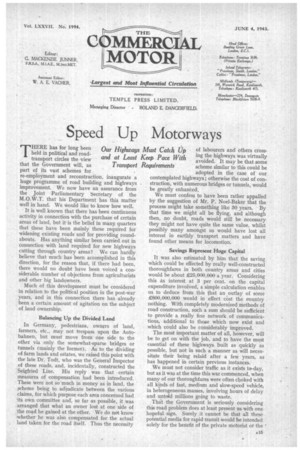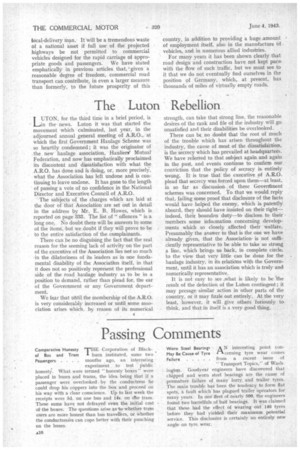Speed Up Motorways T HERE has for long been Our Highways
Page 17

Page 18

If you've noticed an error in this article please click here to report it so we can fix it.
held in political and road transport circles the view and at Least that the Government will, as Transport part of its vast schemes for re-employment and reconstruction, inaugurate a huge programme of road building and highways improvement. We now have an assurance from the Joint Parliamentary Secretary of the M.O.W.T. that his Department has this matter well in hand. We would like to know how well.
It is well known that there has been continuous activity in connection with the purchase of certain areas of land, but it is the belief in many. quarters that these have been mainly those required for widening existing roads and for providing roundabouts. Has anything similar been carried, out in connection with land required for new highways cutting through country areas? We can hardly believe that much has been accomplished in this direction, for the reason that, if there had been, there would no doubt have been voiced a considerable number of objections from agriculturists and other big landowners.
Much of this development must be considered in relation to the political position in the post-war years, and in this connection there has already been a certain amount of agitation on the subject of land ownership.
Balancing Up the Divided Land In Germany, pedestrians, owners of land, farmers, etc., may not trespass upon the Autobahnen, but must move from one side to the other via only the somewhat-sparse bridges or tunnels (mainly the former). As to the dividing of farm lands and estates, we raised this point with the late Dr. Todt, who was the General Inspector of these roads, and, incidentally, constructed the Seigfried Line. His reply was that • certain measures of compensation had been introduced. These were not so 'much in money as in land, the scheme being to adjudicate between the various claims, for which purpose each area concerned had its own committee and, so far as possible, it was arranged that what an owner lost at one side of the road he gained at the other. We do not know .whether he was also compensated for the actual land taken for the road itself. Thus the necessity of labourers and others crossing the highways was virtually avoided. It may be that some scheme similar to this could be adopted in the case of our contemplated highways; otherwise the cost of construction, with numerous bridges or tunnels, would be greatly enhanced.
We must confess to have been rather appalled by the suggestion of Mr. P. Noel-Baker that the process might take something like 30 years. By that time we might all be flying, and although then, no doubt, roads would still be necessary they might not have quite the same value, whilst possibly many amongst us would have lost all interest in earthly transport matters and have found other means for locomotion.
Must Catch Up Keep Pace With Requirements
Savings Represent Huge Capital It was also estimated by him that the saving which could be effected by really well-constructed thoroughfares in both country areas and cities would be about £25,000,000 a year. Considering this as interest at 3 per cent. on the capital expenditure involved, a simple calculation enables us to deduce from this that an outlay of some £800,000,000 would in effect cost the country nothing. With completely modernized methods of road construction, such a sum should be sufficient to provide a really fine network of communications, additional to those which now exist and which could also be considerably improved.
The most important matter of all, however, will be to get on with the job, and to have the most essential of these highways built as quickly as possible, but not in such a manner as will necessitate their being relaid after a few years, as has happened in certain previous instances.
We must not consider traffic as it exists to-day, but as it was at the time this war commenced, when many of our thoroughfares were often choked with all kinds of fast, medium and slow-speed vehicle, in heterogeneous masses, involving hours of delay and untold millions going to waste.
That the Government is seriously considering this road problem does at least present us with one hopeful sign. Surely it cannot be that all these potential media for rapid transit would be intended solely for the benefit of the private motorist or the local-delivery man. It will be a tremendous waste of a national asset if full use of the projected highways be not permitted to commercial vehicles designed for the rapid carriage of appropriate goods and passengers. We have stated emphatically in previous articles that, • given a reasonable degree of freedom, commercial road transport can contribute, in even a larger measure than formerly, to the future prosperity of this country, in addition to providing a huge amount of employment itself, also in the manufacture Of vehicles, and in numerous allied industries.
For many years it has been shown clearly that road design and construction have not kept pace with the flow of such traffic, but we must see to it that we do not eventually find ourselves in the position of Germany, which, at present, has thousands of miles of virtually empty roads.




















































